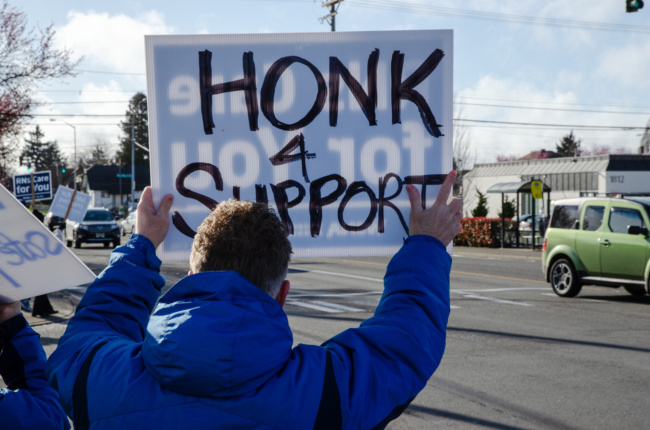St. Joseph’s Tacoma nurses fight for themselves and their patients
April 26, 2019 • 4 minutes to read

As nurses across the country unite and advocate for their profession, St. Joseph’s Tacoma nurses are doing the same for themselves and their patients as they fight the good fight for safe staffing — and against incredibly unsafe, management mandated “alternative staffing.”
Alternative staffing appears to be an attempt by administration to circumvent the state law on safe staffing, its own staffing policies/plans, and the facility’s statutorily empowered staffing committee — all in the name of a race to the bottom in nurse staffing. Basically, at the end of the day what “alternative staffing” means is this: management wants to staff the absolute minimum number of nurses that they care to, on any unit, at any time, no matter patient census or acuity, and based on no written policy or research-based guideline.
It’s the height of absurdity and must be stopped.
St. Joe’s nurses have a long history of working with WSNA together to overcome unsafe patient care practices through nurse engagement, advocacy, and unionism (for example, recently winning a $5 million dollar settlement over rest breaks).
“Alternative staffing” is unsafe for both patients and nurses. Such unsafe staffing practices are also incredibly shortsighted. The reason: nurse turnover. As the research demonstrates, unsafe staffing is a huge factor in nurse burnout, at a time when it costs between $27,000 to $103,000 to replace a nurse. Thus, a hospital experiencing the average RN turnover rate of 19.1% loses an average of $4.4 -$6.9 million dollars a year from nurse turnover — and the cost is much, much greater for larger hospitals and those with unsafe staffing models such as these that lead to nurse burnout.
In short, “alternative staffing models” are unacceptable as they are being used now, and WSNA will challenge them at every turn. We’ve begun this process with a demand to cease and desist and will continue to escalate the issue through regulatory, contractual, political, and potentially legal mechanisms. We believe that such a staffing model contravenes the staffing law, the Joint Commission (TJC) regulations, and is a potentially unsafe nurse manager practice under the nurse practice act.
But we need your help.
When it comes to unsafe staffing, the Department of Health has determined that it needs evidence. We must quantify the incidence and prevalence of the issue and we must be precise in our documentation. You’ve heard management say “if you didn’t document it, it didn’t happen,” and while that saying is false for a number of reasons, it behooves us to document the issue here.
The method? Our online Staffing Complaint/ADO form. We will use these forms as the foundation from which we escalate and attack unsafe staffing on various fronts—no matter which arena, the ADO forms demonstrating unsafe staffing will be paramount. These timely filed complaint forms give us a real time conversation to address and solve the unsafe situation as they occur. This can prevent bad outcomes and errors.
These forms do not go into a black hole. Each and every one is read by your WSNA representatives and nurse rep. Each one is required to be reviewed by the staffing committee. And each one will be used as the piece of evidence that it is to address unsafe staffing.
Please join with us as we unite, not just on one-off comments made in Olympia, but over the incredibly important issue of unsafe staffing.
Things to keep in mind:
- When should you fill out a Staffing Complaint/ADO form? Every single time you see an instance of unsafe staffing, as soon as is practicable.
- Managers cannot invalidate the Staffing Complaint/ADO form if they have not seen a copy of it.
- Talk with your charge nurse in real-time (if no charge, then supervisor or manager on call).
- Either make a copy for your charge nurse/manager or Cc your manager with the electronic Staffing Complaint/ADO.
- What about broken equipment, plugs that don’t work, missed breaks, Charge nurses taking an assignment? All are legitimate reasons to submit the form. Please find more about rationales for submission here.
- What is unsafe staffing? Use your nursing judgment, especially as it relates to acuity. The unit staffing guides, which can be found here, are also a guide: it’s blatantly obvious that staffing is unsafe when the facility is not meeting its own staffing model.
- What if the staffing model from my unit is not online? Please let us know so that we can discuss with the Department of Health.
- Am I protected from retaliation in filling out a staffing complaint? Unequivocally yes. There are state “whistleblower” laws, the staffing law itself, TJC regulations, and contractual language requirements prohibiting retaliation. In addition, unsafe staffing complaints are a matter of concerted protected activity and as such are protected under federal labor law.
- How many complaints are needed? It’s not a matter of reaching a particular number, it’s reaching the point where we have overwhelming evidence of an unsafe staffing issue that we can utilize to escalate and address the problem.
- How long might it take for this situation to be addressed? To be completely frank: this is not an overnight solution. It will take time to gather the evidence, escalate the problem on several fronts, and get to the place where the problem is solved. It will require buy-in and sustained engagement. Suffice to say, we’re going to be fighting this at every turn.

